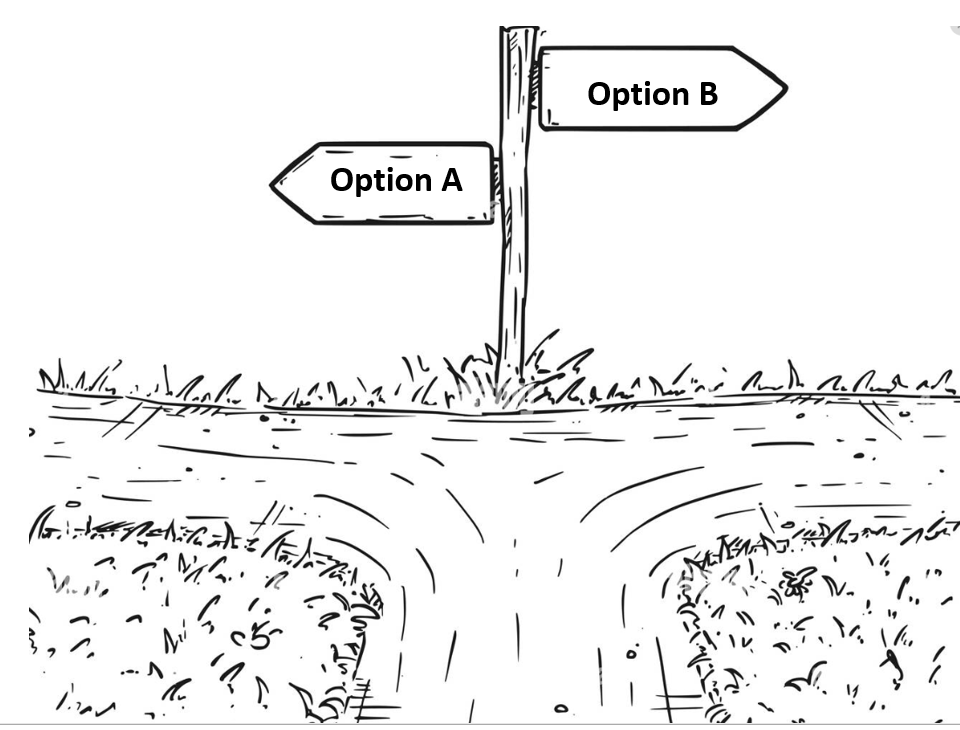My first Discrete Choice Experiment
By Luís Filipe
In the interview for my current position in the MIDAS theme, ARC NWC, I was asked about which methodologies I had used in the past. After I listed the tools I acquired during my still young career, my interviewers asked me if I knew anything about discrete choice experiments (DCEs). I explained I only had a basic idea, but that it was already in my list of things to learn. They said if I were to be hired, MIDAS would be interested in having me developing knowledge on DCEs.
I just need to make note before I continue. A DCE is a methodology that puts dilemmas in front of people and asks them to choose. For example, they can be two hypothetical new treatments, A and B. If people choose treatment A over B, they are implicitly saying they prefer the characteristics of treatment A. So, if we keep presenting the dilemma to them, but “randomizing” the characteristics each time, we can use statistics to determine which characteristics are driving peoples’ choices.

Back to the story… soon after I joined, my line manager encouraged me to attend a DCE course. Problem was… the pandemic. The good DCE courses were only face-to-face, which meant they were cancelled, and while there were a lot of online courses at the time, none was suitable for my problem. So, I was left with only one option: learning by doing.
I just needed an idea. At the time, all researchers were doing something about Covid-19, except me. Thus, I decided to try a DCE that would help answer a question about Covid-19.
At the time, there was a big debate about health vs. economy, I chose to apply a DCE to understand how much people would be willing to sacrifice to save lives. While this is quite a sensitive topic, this type of information is important to help politicians designing strategies that match people’s preferences. For example, if the individuals would be willing to go into a lockdown to avoid X number of daily deaths, and the government believes a lockdown saves more than X lives per day, then they should do it.
As I was only experimenting and it was my first DCE, I did not feel comfortable in searching for public funding and running the risk of not delivering. Instead, I joined some Portuguese friends that were doing small online surveys about Covid-19 in Portugal and invited them to do a DCE with me. That means that unfortunately, I do not have answers for the UK.
We designed a DCE and shared the survey online, for anyone who would be kind enough to give us their answers (anonymously, of course). The characteristics we chose to include in our design were: daily Covid-19 deaths, income lost, educational impairments, social restrictions and risk of poverty:
| Attributes | Units | Low | Medium | Maximum |
|---|---|---|---|---|
| COVID-19 related deaths | Daily deaths attributed to the pandemic either directly (i.e., COVID-19 infection) or indirectly (i.e., limited response by the health care system | 50 | 150 | 250 |
| Household income lost | % decrease in respondent’s household income motivated by the pandemic | 10 | 20 | 30 |
| Educational impairment | % of students permanently affected by the pandemic in the school population | 10 | 20 | 30 |
| Life restrictions | Type of restrictions in place for all the citizens | Large-events restrictions and no bars/ clubs | Night curfew and max 5 people gatherings | Full lockdown |
| Poverty level | % of the population in risk of poverty | 25 | 35 | 45 |
We found that, during the first 6 months of 2021, our respondents would be willing to:
• give up 20% of their income (from losing 10% to losing 30%) to avoid 47 daily deaths;
• accept 20% of the school population to become educationally impaired to avoid 25 daily deaths;
• a strict lockdown to avoid 23 daily deaths;
• 20% of the population to become at the risk of poverty to avoid 100 deaths;
According to these respondents, if a lockdown had only effects on people’s freedom (no income, education, or poverty effects), the Portuguese government should consider a lockdown if it was predicted do save more than 23 lives. If it also caused effects on the other categories, then their correspondent willingness to accept should also be considered when deciding.
Note, Portugal has a population almost seven times smaller than the UK, so, multiplying by seven may provide a rough comparison with UK numbers.
Interestingly, women and people working on site were found to be more willing to accept the policies to contain the pandemic in order to save lives. Conversely, men and people working from home would need more lives saved to accept the negative consequences of the policies.
This was my first DCE and I just managed to get it published. I am hopping the next one will be of interest to the UK and the NWC.
To know more about this study, consult the paper at:
https://journals.plos.org/plosone/article?id=10.1371/journal.pone.0278526
To know more about DCEs, consult this video:
https://www.youtube.com/watch?v=dkYTvoNg_m4&ab_channel=ARCNWC